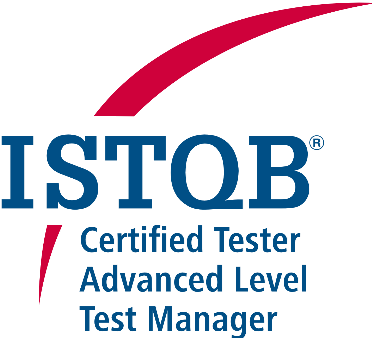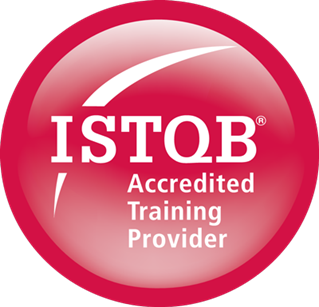Advanced Tester Certification — Test Manager
Prepare for the ISTQB® Advanced Level—Test Manager Certification Exam


Accredited training for the ISTQB® Advanced Tester Certification—Test Manager (CTAL-TM) certification. This five-day course focuses on areas vital for successful test management: foundations of software testing, test management, standards and test improvement processes, and people skills.
Class Schedule
Upcoming Public Sessions
- Integrate testing into your software development process
- Establish a realistic test approach and strategy
- Understand the Test Manager’s role in reviews
- Plan, estimate, and schedule the testing effort
- Dynamically monitor, manage, and report testing activities
- Understand the Test Manager’s role in defect management
- Plan and implement test automation
- Measure test effectiveness and project progress
- Evaluate and improve your test process
- Develop new skills to lead your test team
The ISTQB® Advanced Tester Certification—Test Manager training course expands on the test techniques and methods introduced in the ISTQB
Foundation certification course and addresses those areas of the ISTQB advanced syllabus specifically related to the Advanced Test Management certification.
The course focuses on the key areas that are vital for successful test management: the foundations of software testing, test management, standards and test improvement processes, and people skills.
Specific topics covered include testing as part of the software development lifecycle, metrics, test documentation, risk analysis, estimation, test management issues, test automation, process improvement models,
individual skills for testers and managers, team dynamics, leadership, and motivation.
This course is filled with hands-on exercises to help you practice the methods and techniques taught in the course.
This course covers the syllabus for the Advanced Test Management certification and will help you prepare for the exam.
- Individuals who have taken the ISTQB Certified Tester—Foundation Level training and wish to expand their knowledge and skills into more advanced areas
- Individuals who have received the ISTQB Foundation Level certification, have met the criteria for taking the advanced certification exams, and wish to prepare for those exams.
- Anyone wishing to learn more about advanced testing topics
Pre-Qualification for the Advanced Certification Exam
In order to be eligible to take any of the Certified Tester—Advanced Level (CTAL) exams, potential examinees must submit proof of Certified Tester—Foundation Level (CTFL) certification. CTAL exams
are not given at the end of class. After pre-qualification is completed, students receive an exam voucher good for one year. To learn more about Advanced Tester Certification, or to schedule a
personal certification planning consultation with one of our Training Advocates via the
Contact Us Page or call +1.609.975.9294
.
1.1 Fundamental Test Process
1.2.1 Test Planning
Activity timing
1.2.2 Test Monitoring and Control
1.3 Test Analysis
Advantages of Detailed Test Conditions
Disadvantages of Detailed Test Conditions
When Are Detailed Test Conditions Effective?
1.3 Test Analysis Exercise
1.4 Test Design
Mapping test cases to requirements
Inventory tracking matrix
1.4 Test Design Exercise
1.5 Test Implementation
Sequence of Test Execution
Disadvantages of Early Test Implementation
Advantages of Early Test Implementation
1.5 Test Implementation Exercise
1.6 Test Execution
1.6 Test Execution Exercise
1.7 Evaluating Exit Criteria and Reporting
1.8 Test Closure Activities
Test Completion
Test Artifact Handover
Lessons Learned
1.8 Test Closure Activities Exercise
2.2 Test Management in Context
Understanding Stakeholders
Who Are the Stakeholders?
Other SDLC Activities and Products
Alignment of Test Activities
Sequential Models
Additional Test Levels
Elements of a Test Level
Levels of Testing Within the Lifecycle
Managing Non-Functional Testing
Integrating Non-Functional Tests into SDLC
Benefits and Challenges of Experience-Based Testing
Managing Experience-Based Testing
2.2 Stakeholder Exercise
2.3 Risk-Based Testing
Quality Risks
Risk Identification
Categorization of Risk
Light-weight Risk-Based Testing Techniques
Heavy-weight Risk-Based Testing Techniques
Measuring Success of Risk-Based Testing
Techniques for Test Selection
2.3 Risk-Based Testing Exercise
2.4 Test Documentation
Test Documentation
Test policy
Test strategy
Master test plan
Level test plan
Test Policy
Project Risk Management
Examples of Project Risk Mitigation
Managing Project Risk
2.4 Test Documentation Exercise
2.5 Test Estimation
Factors that influence test estimation
How good is our industry (at estimating)?
2.5 Test Estimation Exercise
2.6 Defining and Using Test Metrics
What makes a good measure?
Metrics for test closure
Using metrics
Using metrics for test control
A sample tester’s dashboard
Exercise – Metrics
2.6 Defining and Using Test Metrics Exercise
2.7 Business Value of Testing
Quantitative value of testing
Economics of test and failure
Qualitative value of testing
Cost of (poor) quality
2.7 Business Value of Testing Exercise
2.8 Distributed, Outsourced, and Insourced Testing
2.9 Managing the Application of Industry Standards
Sources of standards
International standards
Sample ISO standards
IEEE
Example of national standard
Domain-Specific standards
CMMI – Capability Maturity Model Integration
PMI, PRINCE2 and ITIL
Considerations when using standards
2.9 Managing the Application of Industry Standards Example 1
3.2 Management Reviews and Audits
Key Characteristics
Audits
Key Characteristics of Audits
3.3 Managing Reviews
Formulating a Review Strategy
Addressing Reviews During Test Planning
Measuring the Effectiveness of Reviews
3.3 Managing Reviews Exercise
3.4 Metrics for Reviews
Metrics for Product Evaluation
Metrics for Process Evaluation
3.4 Metrics for Reviews Exercise
3.5 Managing Formal Reviews
Characteristics of a Formal Reviews
Fulfillment of Prerequisites
4.2 Defect Lifecycle and SDLC
Economics of test and failure
Defect Workflow and States
Cross-Functional Defect Management
4.2 Defect Lifecycle and SDLC Exercise
4.3 Defect Report Information
Defect Data
Standards for Defect Reporting
ISO 9126
IEEE 829
IEEE 1044
Orthogonal defect classification
4.3 Defect Report Information Exercise
4.4 Assessing Process Capability
Using Defects for Process Improvement
5.2 Test Improvement Process
Why test process improvement models?
Process assessment
Process capability determination
Process improvement
Process assessment
Types of process improvement models
5.3 Improving the Test Process
Test Improvement Models
Improving the Testing Process
Change process steps: IDEAL
5.3 Improving the Test Process Exercise
5.4 Improving the Test Process with TMMi
5.5 Improving the Test Process with TPI Next
5.6 Improving the Test Process with CTP
5.7 Improving the Test Process with STEP
6.0 Test tools and automation
6.2 Tool Selection
6.3 Tool Lifecycle
6.3 Tool Metrics
7.0 People skills
7.2 Individual Skills
Testers
User View
Software Development Process
Test Techniques
For Test Managers
Interpersonal Skills
Building the Perfect Team
Skills Assessment
Skills Exercise
7.3 Test Team Dynamics
Test Team Dynamics – New Staff Members
Technical Skills-Hard Skills
Technical Skills-Soft Skills
7.4 Testing within an Organization
7.5 Motivation
7.6 Communications
- Exam Voucher: Once you submit a proof of your Certified Tester—Foundation Level (CTFL) certification (a pre-requisite) you will receive an exam voucher good for one year.
- Easy course access: Attend training right from your computer and easily connect your audio via computer or phone. Easy and quick access fits today ís working style and eliminates expensive travel and long days in the classroom.
- Live, expert instruction: Instructors are sought-after practitioners, highly-experienced in the industry who deliver a professional learning experience in real-time.
- Valuable course materials: Courses cover the same professional content as our classroom training, and students have direct access to valuable materials.
- Rich virtual learning environment: A variety of tools are built in to the learning platform to engage learners through dynamic delivery and to facilitate a multi-directional flow of information.
- Hands-on exercises: An essential component to any learning experience is applying what you have learned. Using the latest technology, your instructor can provide hands-on exercises, group activities, and breakout sessions.
- Real-time communication: Communicate real-time directly with the instructor. Ask questions, provide comments, and participate in the class discussions.
- Peer interaction: Networking with peers has always been a valuable part of any classroom training. Live Virtual training gives you the opportunity to interact with and learn from the other attendees during breakout sessions, course lecture, and Q&A.
- Small class size: Live Virtual courses are limited in small class size to ensure an opportunity for personal interaction.
Contact Us
Reach out to us via a channel specified below.

- For public sessions discount requests, select "Discounts Info" from the class list, choose the discounts tab then complete the request process. You can then use the instructions below to contact us if you do not get a rapid response.
- For any request or question please use our Contact Us Form. You may also follow up via phone or email using the information provided below.
- We offer live phone support, between 9:00 AM ET to 5:30 PM ET US. Please use the Contact Us Form prior to calling us at +1.609.975.9294 so we can have your information to reference.
- You may also contact us via email. Please use the Contact Us Form prior to sending an email at Grow-Lean-Training@Grow-Lean.com.